车牌识别C语言源码
欢迎加入群105060236讨论。
2011-11-23更新
本算法主要分成这几个部分,图像采集(即图像输入)、图像预处理(粗略定位车牌位置)、图像处理(精确确定车牌位置,去噪)、车牌字符分割(上下边界,左右边界确定)和字符识别。
这是第二版的代码,包含三个文件,主要把匹配的模板从几十个图片合成一个数据库放到一个文件里面,即moban.h
把函数放到另一个文件里面,即Def.h

下图是在Linux下Eclipse工程截图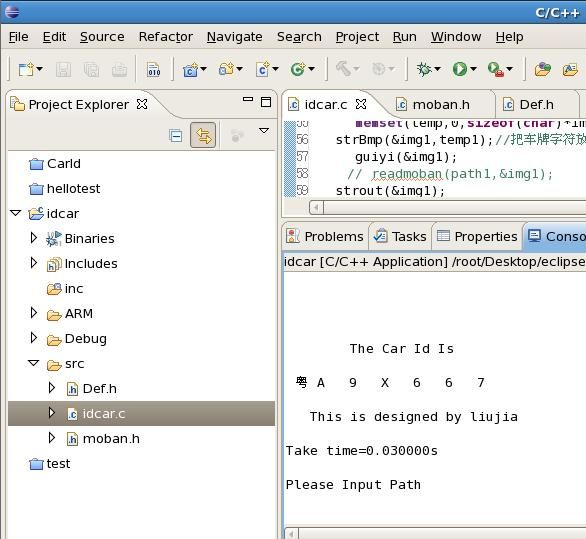
PC计算的结果是30ms。处理的这个车牌图片分辨率是640*480,如下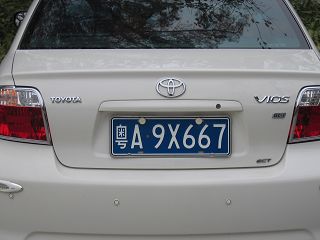
本算法还加入了图像矫正处理,并且具备一定的去噪功能下图
识别结果为
下面是在ARM6410上运行截图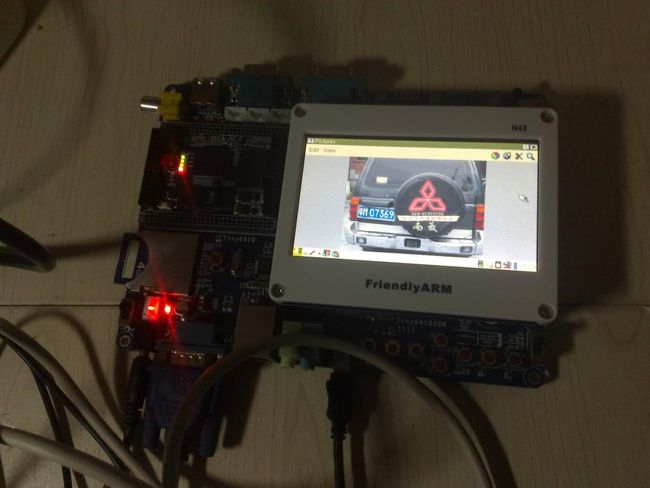

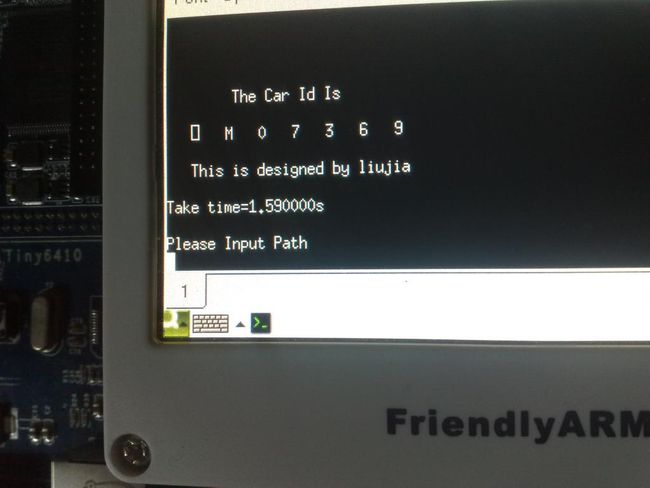

以下是ARM9运行截图
ARM9 2440由于不支持硬浮点,处理640*480的24位bmp位图,非常吃力。平均需要6秒以上,这里还没有加入摄像头采集。
其中ARM9运行的程序,使用的匹配模板是原始的几十个20*40的bmp图片,如下图
这个库文件在后来,整合到了moban.h里面,方便移植。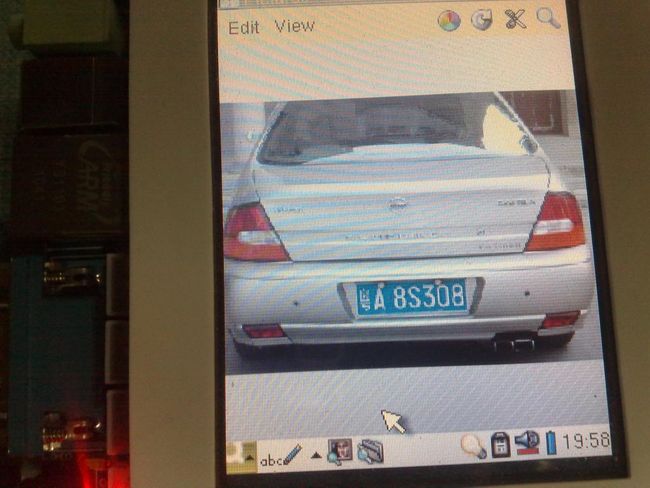

在开发板上只是测试,没有完善的编程软件,由于没有汉字库,所以,不能显示汉字
上图是ARM9平台下。这里使用的是最原始的代码
当然,倾斜矫正和去噪处理加大了运算量。其中倾斜矫正运用霍夫变换的方法,有大量的浮点数据需要计算。占用总处理时间的大部分。
这是最原始的车牌识别程序,有些库没有添加!之后还有改善的,主要是把图像匹配的数据库放到程序中,本程序在arm2440Linux环境下运算需要6秒左右,在6410下需要1秒多,很多地方没有优化。仅供参考
#include
#include
#include
//#include
#include
#include
#include
//#include "cv.h"
//#include "highgui.h"
#include "math.h"
#define pi 3.14
#define RADIAN(angle) ((angle)*3.14/180.0)
#define max(a,b) (((a) > (b)) ? (a) : (b))
#define min(a,b) (((a) < (b)) ? (a) : (b))
typedef unsigned long DWORD;
typedef int BOOL;
typedef unsigned char BYTE;
typedef unsigned short WORD;
typedef float FLOAT;
typedef unsigned char byte;
//#define MAX(a,b,c) a>(b>c?b:c)?a:
struct BMP_img
{
WORD bfType;
DWORD size;
DWORD reser;
DWORD header_length;
DWORD infoheader_length;
DWORD width;
DWORD height;
WORD biplanes;
WORD bmp_type; /* 8bit 24bit; */
DWORD compres;
DWORD datasize;
DWORD bixpm;
DWORD biypm;
DWORD clrused;
DWORD relclrused;
BYTE *image;
byte *header_info;
DWORD lineBytes;
};
struct Bmp1{
DWORD width;
DWORD height;
byte strc[67][800];
BYTE *image;
int p1[15];//xl
int p2[15];//xr
int p3[15];//yu
int p4[15];//yd
int up;
int down;
byte strr[7][2500];
byte string[7];
float ang;//倾斜角度
};
struct HSV{
float H;
float S;
int V;
};
struct RGB{
byte bitb;
byte bitg;
byte bitr;
byte re;
};
void read_img(FILE *infile, struct BMP_img *img);
//void read_img(FILE *infile, struct BMP_img *img);
void displaytwo(struct Bmp1 img,byte *srcBmp,byte *dstBmp,int yuzhi);
unsigned char myGetMedianNum(unsigned char * bArray, int iFilterLen);
void cuizhitouying(struct Bmp1 *img,byte *temp);
void sob(byte *srcBmp,int width,int height,int type);
void shuipingtouying(struct Bmp1 *img,byte *temp);
//void display(BMP_img img,byte *temp);
void grayScale(struct BMP_img img,byte *srcBmp,byte *dstBmp);
void junheng(struct BMP_img img,byte *srcBmp,byte *dstBmp);
void CutBmp(struct BMP_img img,struct Bmp1 *img1,int HL,int HH,int VL,int VH);
void CutBmp1(struct Bmp1 *img1,int HL,int HH,int VL,int VH);
void testhsv(float h,float s,float v,byte r,byte g,byte b);
void hsvzation(byte *image,struct HSV *hsv,int width,int height);
void location(byte *image,int width,int height,int yuzhi,int *HL,int *HH,int *VL,int *VH);
void huidu(struct Bmp1 img,byte *srcBmp,byte *dstBmp);
void bmptwo(struct Bmp1 img,byte *srcBmp,byte *dstBmp,byte yuzhi);
void Thiningtest(struct BMP_img img,byte *srcBmp,byte *dstBmp);
void Thining(byte *srcBmp,int width,int height);
void ThinnerRosenfeld(void *image, unsigned long lx, unsigned long ly);
void delpoint(byte *dst,int width,int height,int yuzhi);
void Erosion(byte *image,int width,int height,int type,int num);
void deljunzao(byte *dst,int width,int height,int yuzhi);
void pingjun(byte *dst,int width,int height);
void changeGray(byte *srcBmp,byte *dstBmp,int width,int height,int nWidth,int nHeight);
byte *changeRGB(byte *srcBmp,int width,int height,int *lwidth,int *lheight,float f);
void strBmp(struct Bmp1 *img,byte *temp);
void guiyi(struct Bmp1 *img);
void readstr(FILE *infile, byte *srcBmp);
char *myitoa(int num, char *str, int radix); // 整数字符串转换。
void readmoban(char *path,struct Bmp1 *img2);
void writebmp(const char *path,const char *name,byte *temp);
int cmpstr(byte *src,byte *moban);
void Hough(struct Bmp1 *img);
void strout(struct Bmp1 *img);
void edgesob8(byte *image,int width,int height);
void edgesob4(byte *image,int width,int height);//4邻域
int hough(byte *srcBmp,int width,int height);
void Dilation(byte *image,int width,int height,int type,int num);
void RotateGray(byte *image,int width,int height, float iRotateAngle);
byte *RotateRGB(byte *image, float iRotateAngle,int width,int height,int *lwidth,int *lheight);
void xuanzhuan(struct Bmp1 *img1);
byte *myMalloc(int num,const byte *bmp,int type);
void guiyiRGB(struct Bmp1 *img1);
void outtext(struct Bmp1 img1,int x,int y);
int calstr(byte *srcBmp);
int main()
{
while(1)
{
int HL=0,HH=0,VH=0,VL=0;
struct BMP_img img;
struct Bmp1 img1;
FILE *f;
byte *temp,*temp1;
//char path[80]="C:\\test\\2.bmp";
char path1[80]="C:\\test\\moban\\";
char path[80];
char path3[40];
printf("Please Input Path\n");
scanf("%s",path3);
strcpy(path,path3);
printf("the path is :%s\n",path);
// char path1[80]="//mnt//arm1//test//moban//";
//char path[80]="C:\\Documents and Settings\\liujia\\桌面\\test\\example06.bmp";
//char path1[80]="C:\\Documents and Settings\\liujia\\桌面\\test\\moban\\";
if((f=fopen(path,"rb"))==NULL)
{
printf( "\nCan not open the path: %s \n", path);
exit(-1);
}
read_img(f, &img);
fclose(f);
temp=myMalloc(img.height*img.width*4,temp,0);//(byte *)malloc(sizeof(byte)*img.height*img.width*4);// byte *temp2=(byte *)malloc(sizeof(byte)*img.height*img.width);
temp1=myMalloc(img.height*img.width*4,temp,0);
location(img.image,img.width,img.height,15,&HL,&HH,&VL,&VH);
CutBmp(img,&img1,HL,HH,VL,VH);
Hough(&img1);
xuanzhuan(&img1);
location(img1.image,img1.width,img1.height,0,&HL,&HH,&VL,&VH);
CutBmp1(&img1,HL,HH,VL,VH);
huidu(img1,img1.image,temp);
displaytwo(img1,temp,temp1,30);
delpoint(temp1,img1.width,img1.height,3);
shuipingtouying(&img1,temp1);
delpoint(temp1,img1.width,img1.height,2);
cuizhitouying(&img1,temp1);
memset(temp,0,sizeof(char)*img1.width*img1.height);
strBmp(&img1,temp1);//把车牌字符放到数组里面
guiyi(&img1);
readmoban(path1,&img1);
strout(&img1);
outtext(img1,0,600);
free(temp1);
free(temp);
getch();
}
return 0;
}
void read_img(FILE *infile, struct BMP_img *img)
{
DWORD i,j,l,bitcolor;
DWORD line24;
DWORD line8;
struct RGB *bitmap;
fread(&img->bfType,sizeof(WORD),1,infile);//printf("\n打开的图为 %d",img->bfType);
fread(&img->size,sizeof(DWORD),1,infile); // printf("\nBMP size :%l",img->size);
fread(&img->reser,sizeof(DWORD),1,infile);//printf("\n保留位:");
fread(&img->header_length,sizeof(DWORD),1,infile); //printf("\nheader length :%l",img->header_length);
fread(&img->infoheader_length,sizeof(DWORD),1,infile);
fread(&img->width, sizeof(DWORD), 1, infile);
fread(&img->height, sizeof(DWORD), 1, infile); //printf( "\nwidth :%l\n height :%l ", img->width, img->height);
fread(&img->biplanes, sizeof(WORD), 1, infile);
fread(&img->bmp_type, sizeof(WORD), 1, infile); // printf("\nBMP Tpye :%l ", img->bmp_type);
fread(&img->compres, sizeof(DWORD), 1, infile); //if(img->compres==0) {printf("\nbmp图片为非压缩!");}printf(" ");
fread(&img->datasize, sizeof(DWORD), 1, infile);//printf("\nBMP Data Size :%l ",img->datasize);
fread(&img->bixpm, sizeof(DWORD), 1, infile);
fread(&img->biypm, sizeof(DWORD), 1, infile);
fread(&img->clrused, sizeof(DWORD), 1, infile); //printf("\n实际使用颜色数=%d ",img->clrused);printf(" ");
fread(&img->relclrused, sizeof(DWORD), 1, infile);
img->lineBytes=(img->width*img->bmp_type+31)/32*4;
//printf("\nLineBytes :%l\n",img->lineBytes);
line24=(img->width*24+31)/32*4;
line8=(img->width*8+31)/32*4;
if(img->bmp_type==1){bitcolor=2;printf("不能读取退出");exit(-1);}
if(img->bmp_type==4){bitcolor=16;printf("不能读取退出");exit(-1);}
if(img->bmp_type==8)
{
byte *temp=(BYTE*)malloc(img->height*line8*sizeof(BYTE));
memset(temp,0x00,img->height*img->lineBytes*sizeof(BYTE));
bitcolor=256;
bitmap=(struct RGB *)calloc(bitcolor,sizeof(struct RGB));
img->image=(unsigned char *)malloc(sizeof(unsigned char)*(line8*img->height));
memset(img->image,0x00,sizeof(byte)*line8*img->height);
if(img->image==NULL) {fprintf(stderr, "\n Allocation error for temp in read_bmp() \n");}
fseek(infile,0x36, SEEK_SET);
fread(bitmap,sizeof(struct RGB),bitcolor,infile);
fseek(infile, img->header_length, SEEK_SET);
//fread(temp, sizeof(unsigned char),lineBytes*img->height, infile);
fread(temp, img->lineBytes*img->height,1, infile);
if(temp==NULL)printf("\n读取失败\n");
for(i=0;i
{
for(j=0;j
{
img->image[i*img->width+j]=(byte)(0.299*bitmap[temp[i*line8+j]].bitb+0.578*bitmap[temp[i*line8+j]].bitg+0.114*bitmap[temp[i*line8+j]].bitr);
// putpixel(j,img->height-i,RGB(img->image[i*img->width+j],img->image[i*img->width+j],img->image[i*img->width+j]));
}
}
free(temp);
temp=NULL;
}
if(img->bmp_type==24)
{
byte *temp=(byte *)malloc(sizeof(byte)*img->height*img->lineBytes); if(temp==NULL)
exit(-1);
img->image=(unsigned char *)malloc(sizeof(unsigned char)*((line24)*img->height));
if(img->image==NULL) fprintf(stderr, "\n Allocation error for temp in read_bmp() \n");
fseek(infile, img->header_length, SEEK_SET);
fread(temp, sizeof(unsigned char), (img->lineBytes)*img->height, infile);
// byte *temp=(byte *)malloc(sizeof(byte)*img->lineBytes*img->height)
for(i=0;i
{
l=0;
for(j=0;j
{
//l=(img->height-i-1)*img->lineBytes+j;
l=(img->height-i-1)*img->width*3+j;
img->image[l+2]=*(temp+i*img->lineBytes+j+2);
img->image[l+1]=*(temp+i*img->lineBytes+j+1);
img->image[l]=*(temp+i*img->lineBytes+j);
}
}
free(temp);
temp=NULL;
}
}
void readstr(FILE *infile, byte *srcBmp)
{
int width,height, headlength;
int i,j,bitcolor,line8;
byte *temp;
byte temp1;
struct RGB *bitmap;
width=20;
height=40;
headlength=1078;
line8=(width*8+31)/32*4;
temp=(BYTE*)malloc(height*line8*sizeof(BYTE));
memset(temp,0x00,height*line8*sizeof(BYTE));
bitcolor=256;
bitmap=(struct RGB *)malloc(sizeof(struct RGB)*bitcolor);
fseek(infile,0x36, SEEK_SET);
fread(bitmap,sizeof(struct RGB),bitcolor,infile);
fseek(infile, headlength, SEEK_SET);
fread(temp, line8*height,1, infile);
if(temp==NULL){printf("\n读取失败\n"); exit(-1);}
for(i=0;i
for(j=0;j
temp1=temp[i*line8+j];
if(temp1>=150)
temp1=255;
else temp1=0;
srcBmp[(height-i-1)*width+j]=temp1;//(byte)(0.299*bitmap[temp[i*line8+j]].bitb+0.578*bitmap[temp[i*line8+j]].bitg+0.114*bitmap[temp[i*line8+j]].bitr);
}
}
free(temp);
temp=NULL;
}
void grayScale(struct BMP_img img,byte *srcBmp,byte *dstBmp) { } { tmp=min(r,g); //tmp=delta/max; hsv[i*width+k].S=0; } } void location(byte *image,int width,int height,int yuzhi,int *HL,int *HH,int *VL,int *VH) temp1=(byte *)malloc(sizeof(byte)*height*width); //int lineBytes=(width*24+31)/32*4; temp1[i*width+j]=255; } maxnum=temp[0]; if(temp[i]>maxnum) flag=1; if(temp[i]==0) break; } for(i=1;i if(temp[i]>maxnum) break; for(i=width;i>*VL;i--) break; } } } } int histogramArray[256]={0}; } /************************************************************************* // 循环变量 byte *lpNewDIBBits=(byte *)malloc(sizeof(byte)*img.height*img.width); hArray=(byte *)malloc(sizeof(byte)*iFilterH*iFilterW); for(i = iFilterMY; i < lHeight - iFilterH + iFilterMY + 1; i++) // 读取滤波器数组 // 保存象素值 // 获取中值 memcpy(temp, lpNewDIBBits, img.width * img.height); // 返回 unsigned char myGetMedianNum(unsigned char * bArray, int iFilterLen) // 中间变量 // 用冒泡法对数组进行排序 // 计算中值 // 返回中值 byte temp; for(i=0;i for(i=2;i for(j=0;j } temp=0; } } j=temp/5; if(p[i]>j) } for(i=0;i } } } } } if(i==height-1) else{ p1[0] = (byte)*(srcBmp+i*width+j); x=abs(p1[0]-p1[2]); //sqrt(( p1[1] - p1[2] )*( p1[1] - p1[2] )); } } int up=0; for(i=0;i for(j=0;j } for(i=1;i } for(i=0;i } } for(k=0;k<7;k++) void junheng(struct BMP_img img,byte *srcBmp,byte *dstBmp) { srcBmp[i*img.width+j]=*(srcBmp+i*img.lineBytes+l); { n[srcBmp[i*width+j]]++; for(i=0;i<256;i++){ max=min=srcBmp[0]; for(i=0;i { for(i=0;i } void CutBmp(struct BMP_img img,struct Bmp1 *img1,int HL,int HH,int VL,int VH) for(x=0,i=HL;i { img1->image[x*img1->width*3+y]=img.image[i*img.width*3+j]; } } //myMalloc(img1->width*img1->height*3,p,0); img1->width=VH-VL; for(x=0,i=HL;i { } } /************************************************** g = (char *)malloc(size); f = (char *)image; do for(j=1; j if(!f[kk]) jj = j + b[k]; if(f[kk1]) kk1 = kk - ly -1; nrnd = n[1] + n[2] + n[3] + n[4] cond = 0; if(n[2]==1 && n48==0 && n567>0) if(n[6]==1 && n48==0 && n123>0) if(n[8]==1 && n26==0 && n345>0) if(n[4]==1 && n26==0 && n781>0) if(n[5]==1 && n46==0) if(n[7]==1 && n68==0) if(n[1]==1 && n82==0) if(n[3]==1 && n24==0) cond = 1; for(i=0; i free(g); void Thining(byte *srcBmp,int width,int height) //循环变量 for(i=0;i if(srcBmp[i*width+j]==0) else } //调用函数进行细化,两种函数可以选择 ThinnerRosenfeld(image,height,width); //ThinnerHilditch(image,lHeight,lWidth); //将结果赋值到原图像中 for(i=0;i } } void Thiningtest(struct BMP_img img,byte *srcBmp,byte *dstBmp) //循环变量 { gray= 0.299*(float)(img.image[lineBytes*i+n+2])+0.578*(float)(*(img.image+lineBytes*i+n+1))+0.114*(float)(*(img.image+lineBytes*i+n)); if(srcBmp[i*img.width+j]==0) else //调用函数进行细化,两种函数可以选择 ThinnerRosenfeld(image,img.height,img.width); //将结果赋值到原图像中 for(i=0;i } } byte *src=(byte *)malloc(sizeof(byte)*width*height); } byte *src=(byte *)malloc(sizeof(byte)*width*height); src[i*width+j]=num; } memcpy(dst,src,sizeof(byte)*width*height); int i=0; BYTE g=0; //double avg=0; void Erosion(byte *image,int width,int height,int type,int num) void changeGray(byte *srcBmp,byte *dstBmp,int width,int height,int nWidth,int nHeight) int i=0,j=0,i0,j0; //memset(srcBmp,0x00,nHeight*nWidth*sizeof(byte)); } for(n=0,k=img->p1[i];k<=img->p2[i];k++,n++) changeGray(img->strr[i],temp,xxx,yyy,20,40); memcpy(img->strr[i],temp,sizeof(byte)*800); void readmoban(char *path,struct Bmp1 *img2) } } char *myitoa(int num,char *str,int radix) char index[]="0123456789ABCDEFGHIJKLMNOPQRSTUVWXYZ";/* 索引表 */ if(radix==10&&num<0) /* 十进制负数 */ void writebmp(const char *path,const char *name,byte *temp) FILE *f1,*f2; for(i=0;i<40;i++) temp1=temp[i*20+j]; if((f2=fopen(path2,"wb"))==NULL) } if(fwrite(p3,20*40,1,f2)!=1) } } for(i=1;i<7;i++) } } /*if((n==6)||(n==3)) i=i; for(i=0;i<40;i++) } } return k; } void edgesob8(byte *image,int width,int height)//8邻域 //int sum1,sum2,sum;double gray; temp[i*width+j]=255; else temp[i*width+j]=0; } // int sum1,sum2,sum;double gray; if(i==height-1) else{ p[0] = (byte)*(image+i*width+j); } return kmax; void RotateGray(byte *image,int width,int height, float iRotateAngle) // 循环变量 // 旋转角度(弧度) byte *temp=(byte *)malloc(sizeof(byte)*lNewHeight*lNewWidth); // 将旋转角度从度转换到弧度 // 计算新图四个角的坐标(以图像中心为坐标系原点) // 计算旋转后的图像高度 memset(temp,(byte)0,lNewHeight*lNewWidth*sizeof(byte)); // 针对图像每行进行操作 // 计算该象素在源DIB中的坐标 // 判断是否在源图范围内 void xuanzhuan(struct Bmp1 *img1) byte *p; i0 = (unsigned int) (i/f + 0.5); *(temp + k+1)=*(srcBmp + n+1); } } printf("\n\n\n\n\n\n\n\n"); } byte *RotateRGB(byte *image, float iRotateAngle,int width,int height,int *lwidth,int *lheight) // 象素在源DIB中的坐标 // 旋转角度(弧度) // 计算新图四个角的坐标(以图像中心为坐标系原点) // 计算旋转后的图像高度 temp=myMalloc(lNewHeight*lNewWidth*3,0,0); // 计算该象素在源DIB中的坐标 // 判断是否在源图范围内 *lwidth=lNewWidth;
{
int i,j,temp1,n;
float gray;
temp1=img.width*3;
srcBmp=img.image;
for(i=0;i
for(j=0,n=0;j
gray=(*(srcBmp+i*img.lineBytes+n+2)*0.299)+(*(srcBmp+i*img.lineBytes+n+1)*0.578)+(*(srcBmp+i*img.lineBytes+n)*0.114);
dstBmp[i*img.lineBytes+n]=(byte)(gray+0.5);
dstBmp[i*img.lineBytes+n+1]=(byte)(gray+0.5);
dstBmp[i*img.lineBytes+n+2]=(byte)(gray+0.5);
}
}
void huidu(struct Bmp1 img,byte *srcBmp,byte *dstBmp)
{
int i,j,n;
float gray;
srcBmp=img.image;
for(i=0;i
for(j=0,n=0;j
gray=(*(srcBmp+i*img.width*3+n+2)*0.299)+(*(srcBmp+i*img.width*3+n+1)*0.578)+(*(srcBmp+i*img.width*3+n)*0.114);
dstBmp[i*img.width+j]=(byte)(gray+0.5);
}
}
}
void hsvzation(byte *image,struct HSV *hsv,int width,int height)
{
int i,j,k;
float min,max,delta,tmp;//h,s,v,m,n;
//int lineBytes=(width*24+31)/32*4;
byte r,g,b;
for(i=0;i
for(k=0,j=0;j
g=image[i*width*3+j+1];
b=image[i*width*3+j];
r=image[i*width*3+j+2];
min=min(tmp,b);
tmp=max(r,g);
max=max(tmp,b);
hsv[i*width+k].V=(int)max;
delta=max-min;
if(delta==0)
{
hsv[i*width+k].H=0;
continue;
//value=0;
//return value;
}
if(max!=0)
{
hsv[i*width+k].S=delta/max;//tmp;
}
else
{
hsv[i*width+k].H=0;
continue;
if(r==max)
{
// tmp=(g-b)/delta;
hsv[i*width+k].H=(g-b)/delta;//tmp;
}
else if(g==max)
hsv[i*width+k].H=2+(b-r);
else
{
//tmp=4+(r-g)/delta;
hsv[i*width+k].H=4+(r-g)/delta;//tmp;
}
hsv[i*width+k].H*=60;
if(hsv[i*width+k].H<0)
hsv[i*width+k].H+=360;
//value=(int)(h+0.5);
}
}
{
int i,j,n,maxnum,flag=0;
struct HSV *hsv;
int temp[2000]={0};
byte *temp1;
hsv=(struct HSV *)malloc(sizeof(struct HSV)*width*height);
hsvzation(image,hsv,width,height);
for(i=0;i
for(j=0,n=0;j
if((hsv[i*width+j].H<220.0)&&(hsv[i*width+j].H>180.0)&&(hsv[i*width+j].V<250)&&(hsv[i*width+j].S>0.6))
{
//putpixel(j,i,RGB(255,255,255));
}
else
{
temp1[i*width+j]=0;
//putpixel(j,i,RGB(0,0,0));
}
}
}
for(i=0;i
for(j=0;j
if(temp1[i*width+j]==255)
{
temp[i]++;
}
}
edgesob8(temp1,width,height);
for(i=1;i
maxnum=temp[i];
}
maxnum=maxnum/3;
for(i=0;i
if(flag==0)
{
if(temp[i]>maxnum)
{
*HL=i-yuzhi;
}
}
if(flag==1)
{
{
*HH=i+yuzhi;
}
}
}
memset(temp,0x00,sizeof(int)*width);
for(i=0;i
for(j=0;j
if(temp1[j*width+i]==255)
{
temp[i]++;
}
}
flag=0;
maxnum=temp[0];
maxnum=temp[i];
}
maxnum=maxnum/3;
for(i=0;i
if(temp[i]>maxnum)
{
*VL=i-yuzhi;
}
}
{
if(temp[i]>maxnum)
{
*VH=i+yuzhi;
}
free(temp1);
temp1=NULL;
free(hsv);
}
void Hough(struct Bmp1 *img)
{
int i,j,n;
float ang;
byte *temp1;
//int temp[2000]={0};
struct HSV *hsv=(struct HSV *)malloc(sizeof(struct HSV)*img->width*img->height);
hsvzation(img->image,hsv,img->width,img->height);
temp1=(byte *)malloc(sizeof(byte)*img->height*img->width);
for(i=0;i
{
for(j=0,n=0;j
{
if((hsv[i*img->width+j].H<220.0)&&(hsv[i*img->width+j].H>180.0)&&(hsv[i*img->width+j].V<250)&&(hsv[i*img->width+j].S>0.6))
{
temp1[i*img->width+j]=255;
}
else
{
temp1[i*img->width+j]=0;
}
}
Dilation(temp1,img->width,img->height,1,5);
sob(temp1,img->width,img->height,0);
ang=hough(temp1,img->width,img->height);
if((ang<=8)&&(ang>=1))
ang=ang-1;
if(ang>90)
{
ang=ang-180;
img->ang=ang;
void bmptwo(struct Bmp1 img,byte *srcBmp,byte *dstBmp,byte yuzhi)
{
int i,j;
for(i=0;i
for(j=0;j
if(srcBmp[i*img.width+j]>=yuzhi)
{
dstBmp[i*img.width+j]=255;
}
else
{
dstBmp[i*img.width+j]=0;
}
}
}
}
void displaytwo(struct Bmp1 img,byte *srcBmp,byte *dstBmp,int yuzhi)
{
//int i,j,T,n,k,t,l;
//int m;
int totalPixels = img.width * img.height;
int bestT = 0;
int i,j;
double densityArray[256]={0};
double u0 = 0;
double u1 = 0;
double w0 = 0;
double w1 = 0;
double bestDeviation = 0;
for(i=0;i
for(j=0;j
histogramArray[srcBmp[i*img.width+j]]++;
}
}
for(i=0;i<256;i++)
{
densityArray[i] = histogramArray[i] * 1.0 / totalPixels;
}
for (i = 0; i < 256; i++)
{
w0 = 0;
w1 = 0;
for (j = 0; j <= i; j++) {
w0 += densityArray[j];
}
for (j = i + 1; j < 256; j++) {
w1 += densityArray[j];
}
u0 = 0;
u1 = 0;
for (j = 0; j <= i; j++) {
u0 += j * densityArray[j];
}
for (j = i + 1; j < 256; j++) {
u1 += j * densityArray[j];
}
u0 = u0 / w0;
u1 = u1 / w1;
if (w0 * w1 * (u0 - u1) * (u0 - u1) > bestDeviation) {
bestT = i;
bestDeviation = w0 * w1 * (u0 - u1) * (u0 - u1);
}
}
for (i = 0; i < 256; i++) {
histogramArray[i] = 0;
}
bestT=bestT+yuzhi;
if(bestT<0)
bestT=0;
if(bestT>255)
bestT=255;
for(i=0;i
for(j=0;j
if(srcBmp[i*img.width+j]>bestT)
{
dstBmp[i*img.width+j]=255;
else
{
dstBmp[i*img.width+j]=0;
}
}
}
}
*
* 函数名称:
* MedianFilter()
*
* 参数:
* LPSTR lpDIBBits - 指向源DIB图像指针
* LONG lWidth - 源图像宽度(象素数)
* LONG lHeight - 源图像高度(象素数)
* int iFilterH - 滤波器的高度
* int iFilterW - 滤波器的宽度
* int iFilterMX - 滤波器的中心元素X坐标
* int iFilterMY - 滤波器的中心元素Y坐标
*
* 返回值:
* BOOL - 成功返回TRUE,否则返回FALSE。
*
* 说明:
* 该函数对DIB图像进行中值滤波。
*
************************************************************************/
int myMedianFilter(struct Bmp1 img,byte *temp,int iFilterH,int iFilterW,int iFilterMX,int iFilterMY)
{
unsigned char* lpSrc;
unsigned char* lpDst;
int lHeight=img.height;
int lWidth=img.width;
unsigned char *aValue;
byte *hArray;
int i,j,l,k;
if(lpNewDIBBits==NULL)
exit(-1);
memcpy(lpNewDIBBits,temp, img.width * lHeight);
aValue=(byte *)malloc(sizeof(byte)*iFilterH*iFilterW);
{
// 列(除去边缘几列)
for(j = iFilterMX; j < lWidth - iFilterW + iFilterMX + 1; j++)
{
// 指向新DIB第i行,第j个象素的指针
lpDst = (unsigned char*)lpNewDIBBits + img.width * (lHeight - 1 - i) + j;
for (k = 0; k < iFilterH; k++)
{
for (l = 0; l < iFilterW; l++)
{
// 指向DIB第i - iFilterMY + k行,第j - iFilterMX + l个象素的指针
lpSrc = (unsigned char*)temp + img.width * (lHeight - 1 - i + iFilterMY - k) + j - iFilterMX + l;
aValue[k * iFilterW + l] = *lpSrc;
}
}
* lpDst = myGetMedianNum(aValue, iFilterH * iFilterW);
}
}
// 释放内存
free(lpNewDIBBits);
lpNewDIBBits=NULL;
free(hArray);
hArray=NULL;
return 1;
}
/*************************************************************************
*
* 函数名称:
* GetMedianNum()
*
* 参数:
* unsigned char * bpArray - 指向要获取中值的数组指针
* int iFilterLen - 数组长度
*
* 返回值:
* unsigned char - 返回指定数组的中值。
*
* 说明:
* 该函数用冒泡法对一维数组进行排序,并返回数组元素的中值。
*
************************************************************************/
{
// 循环变量
int i;
int j;
unsigned char bTemp;
for (j = 0; j < iFilterLen - 1; j ++)
{
for (i = 0; i < iFilterLen - j - 1; i ++)
{
if (bArray[i] > bArray[i + 1])
{
// 互换
bTemp = bArray[i];
bArray[i] = bArray[i + 1];
bArray[i + 1] = bTemp;
}
}
}
if ((iFilterLen & 1) > 0)
{
// 数组有奇数个元素,返回中间一个元素
bTemp = bArray[(iFilterLen + 1) / 2];
}
else
{
// 数组有偶数个元素,返回中间两个元素平均值
bTemp = (bArray[iFilterLen / 2] + bArray[iFilterLen / 2 + 1]) / 2;
}
return bTemp;
}
void shuipingtouying(struct Bmp1 *img,byte *dst)//得到车牌的上下边缘
{
int i,j;
//int *p=(int *)malloc(sizeof(int)*img.height);
int p[500]={0};
memset(p,0,img->height*sizeof(int));
{
if((dst[i]>=200)||(dst[img->width+i]>=200))
for(j=0;j
{
if(dst[j*img->width+i]>=200)
dst[j*img->width+i]=0;
else break;
}
}
for(i=0;i
{
if((dst[img->width*(img->height-1)+i]>=200)||(dst[img->width*(img->height-2)+i]>=200))
for(j=img->height-1;j>0;j--)
{
if(dst[j*img->width+i]>=200)
dst[j*img->width+i]=0;
else break;
}
}
{
{
if(dst[i*img->width+j]>=200)
p[i]++;
}
for(i=0;i
{
if(p[i]>temp)
{
temp=p[i];
for(i=img->height;i>img->up;i--)
{
if(p[i]>j)
{
img->down=i;
break;
}
if(i
exit(-1);
}
j=temp/3;
for(i=0;i
{
{
img->up=i;
break;
}
if(i>img->height/2)
exit(-1);
{
for(j=0;j
{
dst[i*img->width+j]=0;
for(i=img->height;i>img->down+1;i--)
{
for(j=0;j
{
dst[i*img->width+j]=0;
void sob(byte *srcBmp,int width,int height,int type) //sob算子边缘检测;取出边界;
{
int i,j,l,x,y;
// int px[6]={0};
//int py[6]={0};
int p1[4]={0};
//double result;
byte *tempy;
byte *tempx;
tempx=(byte *)malloc(sizeof(byte)*width*width);
if(tempx==NULL)
exit(-1);
tempy=(byte *)malloc(sizeof(byte)*width*width);
if(tempy==NULL)
exit(-1);
for(i =1; i
for(j=1;j
x=0,y=0;
else if(j==width-1)
x=0,y=0;
p1[1] = (byte)*(srcBmp+i*width+j+1);
p1[2] = (byte)*(srcBmp+(i+1)*width+j);
p1[3] = (byte)*(srcBmp+(i+1)*width+j+1);
y=abs(p1[0]-p1[1]);
if(x>0)
x=255;
else
x=0;
if(y>0)
y=255;
else
y=0;
tempx[i*width+j]=(byte)x;
tempy[i*width+j]=(byte)y;
}
}
for (i = 0; i < width; i++)
{
tempx[i] = 0;
tempy[i] = 0;
tempx[width*(height-1)+i] = 0;
tempy[width*(height-1)+i] = 0;
}
for (i = 0; i < height; i++)
{
tempx[i*width] = 0;
tempy[i*width] = 0;
tempx[i*width+width-1] = 0;
tempy[i*width+width-1] = 0;
}
if(type==0)
memcpy(srcBmp,tempx,sizeof(byte)*width*height);
if(type==1)
memcpy(srcBmp,tempy,sizeof(byte)*width*height);
if(type==2)
{
for(i=0;i
l=tempx[i*width+j]+tempy[i*height+j];
if(l>255)
l=255;
tempx[i*width+j]=l;
}
memcpy(srcBmp,tempx,sizeof(byte)*width*height);
}
free(tempx);
free(tempy);
tempx=NULL;
tempy=NULL;
void cuizhitouying(struct Bmp1 *img,byte *temp)
{
int p3[15]={0};
int i,j,k=0,m,num,flag;
//img.p1[15]={0};
//img.p2[15]={0};
int down=0;
int p[500]={0};
{
{
if(temp[j*img->width+i]==255)
{ p[i]++;}
}
{
if(p[i]>0)
{
if((p[i-1]==0)&&(p[i+1]==0))
if(p[i]<5)
p[i]=0;
}
flag=0,m=0;
for(i=0;i
{
if(p[i]>0)
{
flag=1;
m++;
}
if((p[i]==0)&&(flag==1))
break;
}
while(1)
{
num=0;
flag=0;
{
if(p[i]>1)
{
if(flag==0)
{
img->p1[num]=i;
flag=1;
}
else if(p[i]==0)
{
if(flag==1)
{
img->p2[num]=i-1;
flag=0;
j=img->p2[num]-img->p1[num];
if(j
if(p[i-1]<(img->down-img->up)/2)
continue;
}
num++;
}
}
if((flag==1)&&(i==img->width-1))
{
img->p2[num]=i;
num++;
break;
}
if(num==7)
break;
else if(num==8)
{
j=100;
for(i=0;i
p3[i]=img->p2[i]-img->p1[i];
if(p3[i]
j=p3[i];
k=i;
}
}
for(i=k;i<=num-k;i++)
{
img->p1[i]=img->p1[i+1];
img->p2[i]=img->p2[i+1];
}
num--;
break;
}
else //(num<7)
{
for(i=0;i
{
if(p[i]>0)
p[i]--;
}
}
}
flag=0;
up=0;
down=0;
up=img->up-3;
if(up<0)
up=img->up;
down=img->down+4;
if(down>img->height)
down=img->down;
{
for(i=up;i<=down;i++)
{
for(j=img->p1[k];j<=img->p2[k];j++)
{
if(temp[i*img->width+j]==255)
{
img->p3[k]=i;
flag=1;
break;
}
}
if(flag==1)
{
flag=0;
break;
}
}
for(i=down;i>=up;i--)
{
for(j=img->p1[k];j<=img->p2[k];j++)
{
if(temp[i*img->width+j]==255)
{
img->p4[k]=i;
flag=1;
break;
}
}
if(flag==1)
{
flag=0;
break;
}
}
}
}
{
int n[256]={0};
double p[256]={0};
double c[256]={0};
int height=img.height;
int width=img.width;
int totalPixels = width * height;
// double gray=0;
int i,j,max,min,l;
for(i=0;i
for(j=0,l=0;j
//gray=(*(srcBmp+i*img.lineBytes+l+2)*0.299)+(*(srcBmp+i*img.lineBytes+l+1)*0.578)+(*(srcBmp+i*img.lineBytes+l)*0.114);
}
}
for(i=0;i
for(j=0;j
}
}
for(i=0;i<256;i++){
p[i] = n[i]*1.0/totalPixels;
}
for(j=0;j<=i;j++){
c[i]+=p[j]; //累计直方图
}
}
for(j=0;j
n[srcBmp[i*width+j]]++;
}
}
for(i=0;i
for(j=0;j
if(max
else if(min>srcBmp[i*width+j]){min=srcBmp[i*width+j];}
}
}
dstBmp[i*img.lineBytes+j*3+1]=(byte)(c[srcBmp[i*width+j]]*(max-min)+min+0.5);
dstBmp[i*img.lineBytes+j*3+2]=(byte)(c[srcBmp[i*width+j]]*(max-min)+min+0.5);
}
}
//display(img,temp1);
{
int i,j,n;
//float gray;
int x=0,y=0;
img1->width=VH-VL;
img1->height=HH-HL;
img1->image=myMalloc(img1->height*img1->width*3,0,0);//(byte *)malloc(sizeof(byte)*img1->height*img1->width*3);
for(y=0,n=0,j=VL*3;j
img1->image[x*img1->width*3+y+1]=img.image[i*img.width*3+j+1];
img1->image[x*img1->width*3+y+2]=img.image[i*img.width*3+j+2];
}
void CutBmp1(struct Bmp1 *img1,int HL,int HH,int VL,int VH)
{
int i,j,n;
//float gray;
int x=0,y=0;
int width,height;
width=img1->width;
height=img1->height;
img1->height=HH-HL;
for(y=0,n=0,j=VL*3;j
img1->image[x*img1->width*3+y]=img1->image[i*width*3+j];
img1->image[x*img1->width*3+y+1]=img1->image[i*width*3+j+1];
img1->image[x*img1->width*3+y+2]=img1->image[i*width*3+j+2];
}
* 函数名称:
* ThinnerRosenfeld
*
* 参数:
* void* image -二值化图像矩阵前景色为1背景色为0
* unsigned longlx -图像的宽度
* unsigned longly -图像的高度
*
* 返回值
* 无
*
*函数功能:
* 对输入的图像进行细化,输出细化后的图像
***********************************************************/
void ThinnerRosenfeld(void *image, unsigned long lx, unsigned long ly)
{
char *f, *g;
char n[10];
char a[5] = {0, -1, 1, 0, 0};
char b[5] = {0, 0, 0, 1, -1};
char nrnd, cond, n48, n26, n24, n46, n68, n82, n123, n345, n567, n781;
short k, shori;
unsigned long i, j;
long ii, jj, kk, kk1, kk2, kk3, size;
size = (long)lx * (long)ly;
if(g==NULL)
{
printf("error in alocating mmeory!\n");
return;
}
for(kk=0l; kk
g[kk] = f[kk];
}
{
shori = 0;
for(k=1; k<=4; k++)
{
for(i=1; i
ii = i + a[k];
kk = i*ly + j;
continue;
kk1 = ii*ly + jj;
continue;
kk2 = kk1 + 1;
kk3 = kk2 + 1;
n[3] = f[kk1];
n[2] = f[kk2];
n[1] = f[kk3];
kk1 = kk - 1;
kk3 = kk + 1;
n[4] = f[kk1];
n[8] = f[kk3];
kk1 = kk + ly - 1;
kk2 = kk1 + 1;
kk3 = kk2 + 1;
n[5] = f[kk1];
n[6] = f[kk2];
n[7] = f[kk3];
+n[5] + n[6] + n[7] + n[8];
if(nrnd<=1)
continue;
n48 = n[4] + n[8];
n26 = n[2] + n[6];
n24 = n[2] + n[4];
n46 = n[4] + n[6];
n68 = n[6] + n[8];
n82 = n[8] + n[2];
n123 = n[1] + n[2] + n[3];
n345 = n[3] + n[4] + n[5];
n567 = n[5] + n[6] + n[7];
n781 = n[7] + n[8] + n[1];
{
if(!cond)
continue;
g[kk] = 0;
shori = 1;
continue;
}
{
if(!cond)
continue;
g[kk] = 0;
shori = 1;
continue;
}
{
if(!cond)
continue;
g[kk] = 0;
shori = 1;
continue;
}
{
if(!cond)
continue;
g[kk] = 0;
shori = 1;
continue;
}
{
if(!cond)
continue;
g[kk] = 0;
shori = 1;
continue;
}
{
if(!cond)
continue;
g[kk] = 0;
shori = 1;
continue;
}
{
if(!cond)
continue;
g[kk] = 0;
shori = 1;
continue;
}
{
if(!cond)
continue;
g[kk] = 0;
shori = 1;
continue;
}
if(!cond)
continue;
g[kk] = 0;
shori = 1;
}
}
for(j=0; j
kk = i*ly + j;
f[kk] = g[kk];
}
}
}
}while(shori);
}
{
int i,j;
int lWidth=width,lHeight=height;
//建立存储区存放2值矩阵
BYTE *image = (BYTE*)malloc(lWidth*lHeight*sizeof(BYTE));
//DWORD lineBytes=(img.width*24+31)/32*4;
//float gray;
//给2值矩阵赋值
for(j=0;j
image[i*lWidth+j]=0;
image[i*lWidth+j]=1;
//putpixel(j,i,RGB(srcBmp[i*img.width+j],srcBmp[i*img.width+j],srcBmp[i*img.width+j]));
}
for(j=0;j
if(image[i*lWidth+j]==1)
srcBmp[i*width+j]=(BYTE)255;
else
srcBmp[i*width+j]=(BYTE)0;
}
{
int i,j,n;
int lWidth=img.width,lHeight=img.height;
//建立存储区存放2值矩阵
BYTE *image = (BYTE*)malloc(lWidth*lHeight*sizeof(BYTE));
DWORD lineBytes=(img.width*24+31)/32*4;
float gray;
//给2值矩阵赋值
for(i=0;i
for(j=0,n=0;j
if(gray>120.0)
srcBmp[i*img.width+j]=255;
else srcBmp[i*img.width+j]=0;//(byte)gray;
}
}
for(i=0;i
for(j=0;j
image[i*lWidth+j]=1;
image[i*lWidth+j]=0;
}
}
for(j=0;j
if(image[i*lWidth+j]==1)
dstBmp[i*img.width+j]=(BYTE)0;
else
dstBmp[i*img.width+j]=(BYTE)255;
}
void delpoint(byte *dst,int width,int height,int yuzhi)
{
int i,j,num=0,num1;
byte *src=(byte *)malloc(sizeof(byte)*width*height);
memset(src,0x00,sizeof(byte)*width*height);
for(i=1;i
for(j=1;j
if(dst[i*width+j]>200)
{
num1=dst[i*width+j-1]+dst[i*width+j+1]+dst[(i-1)*width+j-1]+dst[(i-1)*width+j]+dst[(i-1)*width+j+1]+dst[(i+1)*width+j-1]+dst[(i+1)*width+j]+dst[(i+1)*width+j+1]+255;
num=num1/255;
if(num>=yuzhi)
//if((dst[i*width+j-1]==0)&&(dst[i*width+j-1]==0)&&(dst[(i-1)*width+j+1]==0)&&(dst[(i-1)*width+j]==0)&&(dst[(i-1)*width+j+1]==0)&&(dst[(i+1)*width+j-1]==0)&&(dst[(i+1)*width+j]==0)&&(dst[(i+1)*width+j+1]==0))
src[i*width+j]=255;
else src[i*width+j]=0;
}
}
}
memcpy(dst,src,sizeof(byte)*width*height);
}
void deljunzao(byte *dst,int width,int height,int yuzhi)
{
int i,j,num=0,num1;
memset(src,0x00,sizeof(byte)*width*height);
for(i=1;i
for(j=1;j
num1=dst[i*width+j-1]+dst[i*width+j+1]+dst[(i-1)*width+j-1]+
dst[(i-1)*width+j]+dst[(i-1)*width+j+1]+dst[(i+1)*width+j-1]+
dst[(i+1)*width+j]+dst[(i+1)*width+j+1]+dst[i*width+j];
num=num1/255;
if(num>=yuzhi)
//if((dst[i*width+j-1]==0)&&(dst[i*width+j-1]==0)&&(dst[(i-1)*width+j+1]==0)&&(dst[(i-1)*width+j]==0)&&(dst[(i-1)*width+j+1]==0)&&(dst[(i+1)*width+j-1]==0)&&(dst[(i+1)*width+j]==0)&&(dst[(i+1)*width+j+1]==0))
src[i*width+j]=255;
else src[i*width+j]=0;
}
for(i=1;i
for(j=1;j
if(dst[i*width+j]>200)
{
num=dst[i*width+j-1]+dst[i*width+j+1]+dst[(i-1)*width+j-1]+dst[(i-1)*width+j]+dst[(i-1)*width+j+1]+dst[(i+1)*width+j-1]+dst[(i+1)*width+j]+dst[(i+1)*width+j+1]+255;
num=num/255;
if(num>=2)
//if((dst[i*width+j-1]==0)&&(dst[i*width+j-1]==0)&&(dst[(i-1)*width+j+1]==0)&&(dst[(i-1)*width+j]==0)&&(dst[(i-1)*width+j+1]==0)&&(dst[(i+1)*width+j-1]==0)&&(dst[(i+1)*width+j]==0)&&(dst[(i+1)*width+j+1]==0))
src[i*width+j]=255;
else src[i*width+j]=0;
}
}
}
memcpy(dst,src,sizeof(byte)*width*height);
}
void pingjun(byte *dst,int width,int height)
{
int i,j,num=0;
float num1;
memset(src,0x00,sizeof(byte)*width*height);
for(i=1;i
for(j=1;j
num1=dst[i*width+j-1]+dst[i*width+j+1]+dst[(i-1)*width+j-1]+
dst[(i-1)*width+j]+dst[(i-1)*width+j+1]+dst[(i+1)*width+j-1]+
dst[(i+1)*width+j]+dst[(i+1)*width+j+1]+dst[i*width+j];
num=(int)(num1/9+0.5);
}
}
void Dilation(byte *image,int width,int height,int type,int num)
{
int dwWidth=width;
int dwHeight=height;
int j=0;
//int n=0;
BYTE *temp;
int k=0;
temp=(BYTE*)malloc(dwHeight*dwWidth*sizeof(BYTE));
memcpy(temp,image,dwHeight*dwWidth*sizeof(byte));
memset(temp,0,dwWidth*dwHeight*sizeof(BYTE));
if(type==0)
{
//水平方向
for(i=0;i
for(j=(num-1)/2;j
for(k=-(num-1)/2;k<=(num-1)/2;k++)
{
g=*(image+dwWidth*i+j+k);
if(g==255)
{
*(temp+dwWidth*i+j)=255;
break;
}
}
}
}
}
else
{
//垂直方向
for(i=(num-1)/2;i
for(j=0;j
for(k=-(num-1)/2;k<=(num-1)/2;k++)
{
g=*(image+dwWidth*(i+k)+j);
if(g==255)
{
*(temp+dwWidth*i+j)=255;
break;
}
}
}
}
}
memcpy(image,temp,sizeof(byte)*width*height);
free(temp);
temp=NULL;
}
{
int dwWidth=width;
int dwHeight=height;
int i=0;
int j=0;
//int n=0;
BYTE g=0;
//double avg=0;
BYTE *temp;
int k=0;
temp=(BYTE*)malloc(dwHeight*dwWidth*sizeof(BYTE));
memset(temp,0,dwWidth*dwHeight*sizeof(BYTE));
if(type==0)
{
//水平方向
for(i=0;i
for(j=(num-1)/2;j
for(k=-(num-1)/2;k<=(num-1)/2;k++)
{
g=*(image+width*i+j+k);
if(g==0)
{
*(temp+width*i+j)=0;
break;
}
}
}
}
}
else
{
//垂直方向
for(i=(num-1)/2;i
for(j=0;j
for(k=-(num-1)/2;k<=(num-1)/2;k++)
{
g=*(image+width*(i+k)+j);
if(g==0)
{
*(temp+width*i+j)=0;
break;
}
}
}
}
}
memcpy(image,temp,sizeof(byte)*width*height);
free(temp);
temp=NULL;
}
{
float xx;float yy;
xx=(float)nWidth/width;
yy=(float)nHeight/height;
memset(dstBmp,0x00,nHeight*nWidth*sizeof(byte));
for(i = 0; i
for(j = 0; j
//i0 = (int) ((float)i/yy+0.5);
//j0 = (int) ((float)j/xx+0.5);
i0 = (int) ((float)i/yy);
j0 = (int) ((float)j/xx);
if((j0>=0)&&(j0
dstBmp[i*nWidth+j]=srcBmp[i0*width+j0];
//}
//else
//{
// dstBmp[i*nWidth+j]=255;
//}
}
}
void strBmp(struct Bmp1 *img,byte *temp)
{
int i,j,k,m,n,o;
//int width=20,height=20;
for(i=0;i<7;i++)
{
o=img->p2[i]-img->p1[i]+1;
for(m=0,j=img->p3[i];j<=img->p4[i];j++,m++)
{
{
img->strr[i][m*o+n]=temp[j*img->width+k];
}
}
}
}
void guiyi(struct Bmp1 *img)
{
int xxx;
int i;
//xxx=img->p2[0]-img->p1[0]+1;
int yyy;
//
byte *temp=(byte *)malloc(sizeof(byte)*800);
//strBmp(&img1,temp1);
for(i=0;i<7;i++)
{
xxx=img->p2[i]-img->p1[i]+1;
yyy=img->p4[i]-img->p3[i]+1;
}
}
{
FILE *f[72];
int i;
char str2[]=".bmp";
char str[80];
char str1[10];
for(i=0;i<=66;i++)
{
//char str[80];
strcpy(str,path);
//char str1[10];
myitoa(i,str1,10);
strcat(str1,str2);
strcat(str,str1);
f[i]=fopen(str,"rb");
if(f[i]==NULL)
exit(-1);
readstr(f[i],img2->strc[i]);
fclose(f[i]);
{
unsigned unum; /* 中间变量 */
int i=0,j,k;/* 确定unum的值 */
{
unum=(unsigned)-num;
str[i++]='-';
}
else unum=(unsigned)num; /* 其他情况 */
/* 逆序 */
do
{
str[i++]=index[unum%(unsigned)radix];
unum/=radix;
}while(unum);
str[i]='\0';
/* 转换 */
if(str[0]=='-') k=1; /* 十进制负数 */
else k=0;
/* 将原来的“/2”改为“/2.0”,保证当num在16~255之间,radix等于16时,也能得到正确结果 */
for(j=k;j<(i-1)/2.0+k;j++)
{
num=str[j];
str[j]=str[i-j-1+k];
str[i-j-1+k]=num;
}
return str;
}
{
int i,j;
byte temp1;
char path1[40];
char path2[40];
char *p1="header.txt";
char p4[5]=".bmp";
char p2[1078];
char p3[800];
strcpy(path1,path);
strcat(path1,p1);
strcpy(path2,path);
strcat(path2,name);
strcat(path2,p4);
if((f1=fopen(path1,"rb"))==NULL)
{
printf( "\n 不能打开 \n");
exit(-1);
}
fread(p2,1078,1,f1);
{
for(j=0;j<20;j++)
{
if(temp1==0)
temp1=0;
else temp1=255;
p3[(40-i-1)*20+j]=temp1;
}
}
{
printf("\n不能创建%s图\n",path1);
exit(-1);
}
if(fwrite(p2,1078*sizeof(BYTE),1,f2)!=1)
{
printf("不能写入%s图\n",path2);
fclose(f2);
fseek(f2,1078,SEEK_SET);
{
printf("不能写入%s图\n",path2);
fclose(f2);
fclose(f1);
fclose(f2);
void strout(struct Bmp1 *img)
{
int i,j,k=0,m=800,n;
//int p[5]={0};
for(i=36;i<67;i++)
{
k=cmpstr(img->strr[0],img->strc[i]);
if(k==0)
{
n=i;
break;
}
else
{
if(k
m=k;
n=i;
}
}
}
img->string[0]=n;
{
n=0;k=0;m=800;
for(j=0;j<36;j++)
{
if((img->p2[i]-img->p1[i])<4)
{
n=1;
break;
k=cmpstr(img->strr[i],img->strc[j]);
if(k==0)
{
n=j;
break;
}
else
{
if(k
m=k;
n=j;
}
}
}
if(n==27)//p&r
{
k=cmpstr(img->strc[27],img->strr[i]);
j=cmpstr(img->strr[i],img->strc[25]);
if(k
else n=25;
}
if(n==0)//0
{
j=cmpstr(img->strc[0],img->strr[i]);
k=cmpstr(img->strr[i],img->strc[12]);
if(j>k)
n=12;
else n=0;
if(n==26)
{
k=cmpstr(img->strc[26],img->strr[i]);
j=cmpstr(img->strr[i],img->strc[0]);
if(k
else n=0;
}
if(n==19)
{
k=cmpstr(img->strc[0],img->strr[i]);
j=cmpstr(img->strr[19],img->strc[i]);
if(k
else n=19;
}
if(n==13)
{
k=cmpstr(img->strc[13],img->strr[i]);
j=cmpstr(img->strr[i],img->strc[0]);
if(k
else n=0;
}
{
k=cmpstr(img->strc[6],img->strr[i]);
j=cmpstr(img->strc[3],img->strr[i]);
if(k
else n=3;
}
if(n==12)
{
k=cmpstr(img->strc[0],img->strr[i]);
j=cmpstr(img->strc[12],img->strr[i]);
if(k
else n=12;
}*/
if(n==14)//E F
{
k=cmpstr(img->strc[14],img->strr[i]);
j=cmpstr(img->strr[i],img->strc[15]);
if(k
else n=15;
}
if(n==8)
{
k=cmpstr(img->strc[8],img->strr[i]);
j=cmpstr(img->strr[i],img->strc[3]);
if(k
else n=3;
}
img->string[i]=n;
}
}
int cmpstr(byte *src,byte *moban)
{
int i,j,k=0;
byte temp[800]={0};
memcpy(temp,src,800);
for(j=0;j<20;j++)
{
if(temp[i*20+j]==255)
{
if(moban[i*20+j]==255)
temp[i*20+j]=0;
}
delpoint(temp,40,20,4);
for(i=0;i<40;i++)
for(j=0;j<20;j++)
{
if(temp[i*20+j]==255)
{
k++;
}
}
int calstr(byte *srcBmp)
{
int i,j,num=0;
for(i=0;i<40;i++)
for(j=0;j<20;j++)
{
if(srcBmp[i*20+j]==255)
{
num++;
}
return num;
}
{
int i,j,logNum;
//int p[8];
BYTE *temp;
temp=(byte*)malloc(sizeof(byte)*width*height);
memset(temp,0x00,sizeof(byte)*width*height);
for(i=3;i
logNum=16*image[i*width+j]-image[(i-2)*width+j]-image[(i-1)*width+j-1]-2*image[(i-1)*width+j]-image[(i-1)*width+j+1]-image[i*width+j-2]-2*image[i*width+j-1]-2*image[i*width+j+1]-image[i*width+j+2]-image[(i+1)*width+j-1]-2*image[(i+1)*width+j]-image[(i+1)*width+j+1]-image[(i+2)*width+j];
if(logNum > 0)
}
memcpy(image,temp,width*height);
free(temp);
temp=NULL;
void edgesob4(byte *image,int width,int height)//4邻域
{
int i,j;
int p[8];
float result;
BYTE *temp=(byte*)malloc(sizeof(byte)*width*height);
memset(temp,0x00,sizeof(byte)*width*height);
for(i =0; i<=height-1; i++) //sob算子边缘检测;取出边界;
{
for(j=0;j<=width-1;j++)//由于使用2×2的模板,为防止越界,所以不处理最下边和最右边的两列像素
{
temp[i*width+j]=0;
else if(j==width-1)
temp[i*width+j]=0;
p[1] = (byte)*(image+i*width+j+1);
p[2] = (byte)*(image+(i+1)*width+j);
p[3] = (byte)*(image+(i+1)*width+j+1);
result = sqrt(( p[0] - p[3] )*( p[0] - p[3] )+( p[1] - p[2] )*( p[1] - p[2] ));
if(result<=0.0)
result=0;
if(result>=255.0)
result=255;
temp[i*width+j] = (byte)result;
}
}
}
memcpy(image,temp,width*height);
free(temp);
temp=NULL;
int hough(byte *srcBmp,int width,int height)
{
int kmax=0;
int pmax=0;
int yuzhi=0;
int i,j,k,n,p=(int)(height*cos(pi)+width*sin(pi));
int mp= (int) (sqrt(width*width + height*height)+1);
int ma=180;//180
//int ap;
int npp[180][1000];
for(i=0;i<180;i++)
for(j=0;j<1000;j++)
npp[i][j]=0;
/*ap=90*(p+mp);
int *npp=(int *)malloc(sizeof(int)*ap);//myMalloc(ap,0,0);
memset(npp,0x00,sizeof(int)*ap);*/
for(i=1;i
if(srcBmp[i*width+j]==255)
{
for(k=1;k
p=(int)(i*cos(pi*k/180)+j*sin(pi*k/180));
p=(int)(p/2+mp/2);
npp[k][p]=npp[k][p]++;
//npp[k*p+k]=npp[k*p+k]++;
}
}
}
kmax=0;
pmax=0;
n=0;
for(i=1;i
if(npp[i][j]>yuzhi)
// if(npp[i*j+i]>yuzhi)
{
yuzhi=npp[i][j];
// yuzhi=npp[i*j+i];
kmax=i;
pmax=j;
}
}
}
{
int i,j,lNewWidth,lNewHeight,i0,j0;
// 旋转后图像的宽度和高度
int ang;
// 象素在源DIB中的坐标
float fRotateAngle;
// 旋转角度的正弦和余弦
float fSina, fCosa;
// 源图四个角的坐标(以图像中心为坐标系原点)
float fSrcX1,fSrcY1,fSrcX2,fSrcY2,fSrcX3,fSrcY3,fSrcX4,fSrcY4;
// 旋转后四个角的坐标(以图像中心为坐标系原点)
float fDstX1,fDstY1,fDstX2,fDstY2,fDstX3,fDstY3,fDstX4,fDstY4;
// 两个中间常量
float f1,f2;
if(temp==NULL)
printf("\nerror\n");
fRotateAngle = (float) RADIAN(iRotateAngle);
// 计算旋转角度的正弦
fSina = (float) sin((double)fRotateAngle);
// 计算旋转角度的余弦
fCosa = (float) cos((double)fRotateAngle);
// 计算原图的四个角的坐标(以图像中心为坐标系原点)
fSrcX1 = (float) (- (width - 1) / 2);
fSrcY1 = (float) ( (height - 1) / 2);
fSrcX2 = (float) ( (width - 1) / 2);
fSrcY2 = (float) ( (height - 1) / 2);
fSrcX3 = (float) (- (width - 1) / 2);
fSrcY3 = (float) (- (height - 1) / 2);
fSrcX4 = (float) ( (width - 1) / 2);
fSrcY4 = (float) (- (height - 1) / 2);
fDstX1 = fCosa * fSrcX1 + fSina * fSrcY1;
fDstY1 = -fSina * fSrcX1 + fCosa * fSrcY1;
fDstX2 = fCosa * fSrcX2 + fSina * fSrcY2;
fDstY2 = -fSina * fSrcX2 + fCosa * fSrcY2;
fDstX3 = fCosa * fSrcX3 + fSina * fSrcY3;
fDstY3 = -fSina * fSrcX3 + fCosa * fSrcY3;
fDstX4 = fCosa * fSrcX4 + fSina * fSrcY4;
fDstY4 = -fSina * fSrcX4 + fCosa * fSrcY4;
// 计算旋转后的图像实际宽度
lNewWidth = (int) ( max( fabs(fDstX4 - fDstX1), fabs(fDstX3 - fDstX2) ) + 0.5);
lNewHeight = (int) ( max( fabs(fDstY4 - fDstY1), fabs(fDstY3 - fDstY2) ) + 0.5);
// 两个常数,这样不用以后每次都计算了
f1 = (float) (-0.5 * (lNewWidth - 1) * fCosa - 0.5 * (lNewHeight - 1) * fSina
+ 0.5 * (width - 1));
f2 = (float) ( 0.5 * (lNewWidth - 1) * fSina - 0.5 * (lNewHeight - 1) * fCosa
+ 0.5 * (height - 1));
for(i = 0; i < lNewHeight; i++)
{
// 针对图像每列进行操作
for(j = 0; j < lNewWidth; j++)
{
i0 = (int) (-((float) j) * fSina + ((float) i) * fCosa + f2 + 0.5);
j0 = (int) ( ((float) j) * fCosa + ((float) i) * fSina + f1 + 0.5);
if( (j0 >= 0) && (j0 < width) && (i0 >= 0) && (i0 < height))
{
// 复制象素
//*(temp + lNewWidth * (lNewHeight - 1 - i) + j)=*(image + width * (height - 1 - i0) + j0);
*(temp + lNewWidth * i + j)=*(image + width * i0 + j0);
}
else
{
// 对于源图中没有的象素,直接赋值为255
*(temp + lNewWidth * i + j) = 0;
//*(temp + lNewWidth * (lNewHeight - 1 - i) + j);
}
}
}
ang=hough(temp,lNewWidth,lNewHeight);
free(temp);
temp=NULL;
}
{
int lwidth=0,lheight=0;
//int nwidth=0,nheight=0;
//float m;
p=RotateRGB(img1->image,img1->ang,img1->width,img1->height,&lwidth,&lheight);
img1->width=lwidth;
img1->height=lheight;
free(img1->image);
img1->image=NULL;
img1->image=p;
}
byte *myMalloc(int num,const byte *bmp,int type)
{
byte *p=(byte *)malloc(sizeof(byte)*num);
if(p==NULL)
exit(-1);
if(type==0)
memset(p,0x00,sizeof(byte)*num);
if(type==1)
memset(p,255,sizeof(byte)*num);
if(type==2)
memcpy(p,bmp,sizeof(byte)*num);
return p;
}
byte *changeRGB(byte *srcBmp,int width,int height,int *lwidth,int *lheight,float f)
{
int i,j,k,i0,j0,m,n;
int nwidth=(int)(f*width+0.5);
int nheight=(int)(f*height+0.5);
byte *temp;
temp=myMalloc(nwidth*nheight,0,0);
for(i = 0; i < nheight; i++)
{
for(m=0,j = 0;j < nwidth;m+=3,j++)
{
j0 = (unsigned int) (j/f + 0.5);
n=i0*width*3+j0*3;
k=nwidth*i*3+m;
if( (j0 >= 0) && (j0 < width) && (i0 >= 0) && (i0 < height))
{
*(temp + k+2)=*(srcBmp+ n+2);
*(temp + k)=*(srcBmp + n);
}
else
{
*(temp + k+1)=0;
*(temp + k+2)=0;
*(temp + k)=0;
}
}
*lwidth=nwidth;
*lheight=nheight;
//displayRGB(temp,nwidth,nheight,0,0);
return temp;
}
void guiyiRGB(struct Bmp1 *img1)
{
int nwidth=0,nheight=0;
float m;
byte *q;
m=1;
if(img1->width<200)
{
m=(float)(200)/img1->width;
q=changeRGB(img1->image,img1->width,img1->height,&nwidth,&nheight,m);
img1->width=nwidth;
img1->height=nheight;
free(img1->image);
img1->image=NULL;
img1->image=q;
}
void outtext(struct Bmp1 img1,int x,int y)
{
char *table[]={"0","1","2","3","4","5","6","7","8","9","A","B","C","D","E","F",\
"G","H","I","J","K","L","M","N","O","P","Q","R","S","T","U","V","W","X","Y","Z","京",\
"冀","津","晋","蒙","辽","吉","黑","沪","苏","浙","皖","闽","赣","鲁","豫","鄂","湘",\
"粤","桂","琼","渝","川","贵","云",\
"藏","陕","甘","青","宁","新"};
int i;
printf("\n The Car Id Is\n");
printf("\n");
for(i=0;i<7;i++)
{
printf(" ");
printf("%s",table[img1.string[i]]);
//outtextxy(x+i*40,y,table[img1.string[i]]);
printf("\n");
printf("\n This is designed by liujia\n");
printf("\n\n\n\n\n\n\n\n");
}
{
byte *temp;
// 循环变量
int i,j,m,n,lNewWidth,lNewHeight,i0,j0;
// 旋转后图像的宽度和高度
float fRotateAngle;
// 旋转角度的正弦和余弦
float fSina, fCosa;
// 源图四个角的坐标(以图像中心为坐标系原点)
float fSrcX1,fSrcY1,fSrcX2,fSrcY2,fSrcX3,fSrcY3,fSrcX4,fSrcY4;
// 旋转后四个角的坐标(以图像中心为坐标系原点)
float fDstX1,fDstY1,fDstX2,fDstY2,fDstX3,fDstY3,fDstX4,fDstY4;
// 两个中间常量
float f1,f2;
// 将旋转角度从度转换到弧度
fRotateAngle = (float) RADIAN(iRotateAngle);
// 计算旋转角度的正弦
fSina = (float) sin((double)fRotateAngle);
// 计算旋转角度的余弦
fCosa = (float) cos((double)fRotateAngle);
// 计算原图的四个角的坐标(以图像中心为坐标系原点)
fSrcX1 = (float) (- (width - 1) / 2);
fSrcY1 = (float) ( (height - 1) / 2);
fSrcX2 = (float) ( (width - 1) / 2);
fSrcY2 = (float) ( (height - 1) / 2);
fSrcX3 = (float) (- (width - 1) / 2);
fSrcY3 = (float) (- (height - 1) / 2);
fSrcX4 = (float) ( (width - 1) / 2);
fSrcY4 = (float) (- (height - 1) / 2);
fDstX1 = fCosa * fSrcX1 + fSina * fSrcY1;
fDstY1 = -fSina * fSrcX1 + fCosa * fSrcY1;
fDstX2 = fCosa * fSrcX2 + fSina * fSrcY2;
fDstY2 = -fSina * fSrcX2 + fCosa * fSrcY2;
fDstX3 = fCosa * fSrcX3 + fSina * fSrcY3;
fDstY3 = -fSina * fSrcX3 + fCosa * fSrcY3;
fDstX4 = fCosa * fSrcX4 + fSina * fSrcY4;
fDstY4 = -fSina * fSrcX4 + fCosa * fSrcY4;
// 计算旋转后的图像实际宽度
lNewWidth = (int) ( max( fabs(fDstX4 - fDstX1), fabs(fDstX3 - fDstX2) ) + 0.5);
lNewHeight = (int) ( max( fabs(fDstY4 - fDstY1), fabs(fDstY3 - fDstY2) ) + 0.5);
// 两个常数,这样不用以后每次都计算了
f1 = (float) (-0.5 * (lNewWidth - 1) * fCosa - 0.5 * (lNewHeight - 1) * fSina
+ 0.5 * (width - 1));
f2 = (float) ( 0.5 * (lNewWidth - 1) * fSina - 0.5 * (lNewHeight - 1) * fCosa
+ 0.5 * (height - 1));
for(i = 0; i < lNewHeight; i++)
{
// 针对图像每列进行操作
for(m=0,j = 0;j < lNewWidth;m+=3,j++)
{
i0 = (int) (-((float) j) * fSina + ((float) i) * fCosa + f2 + 0.5);
j0 = (int) ( ((float) j) * fCosa + ((float) i) * fSina + f1 + 0.5);
if( (j0 >= 0) && (j0 < width) && (i0 >= 0) && (i0 < height))
{
n=i0*width*3+j0*3;
//*(temp + lNewWidth * (lNewHeight - 1 - i) + j)=*(image + width * (height - 1 - i0) + j0);
*(temp + lNewWidth * i*3 + m+1)=*(image + n+1);
*(temp + lNewWidth * i*3 + m+2)=*(image + n+2);
*(temp + lNewWidth * i*3+ m)=*(image + n);
//*(temp1 + n)=0;
}
else
{
// 对于源图中没有的象素,直接赋值为255
*(temp + lNewWidth * i*3+ m+1)=0;
*(temp + lNewWidth * i*3+ m+2)=0;
*(temp + lNewWidth * i*3+ m)=0;
//*(temp + lNewWidth * (lNewHeight - 1 - i) + j);
}
}
}
*lheight=lNewHeight;
return temp;
}